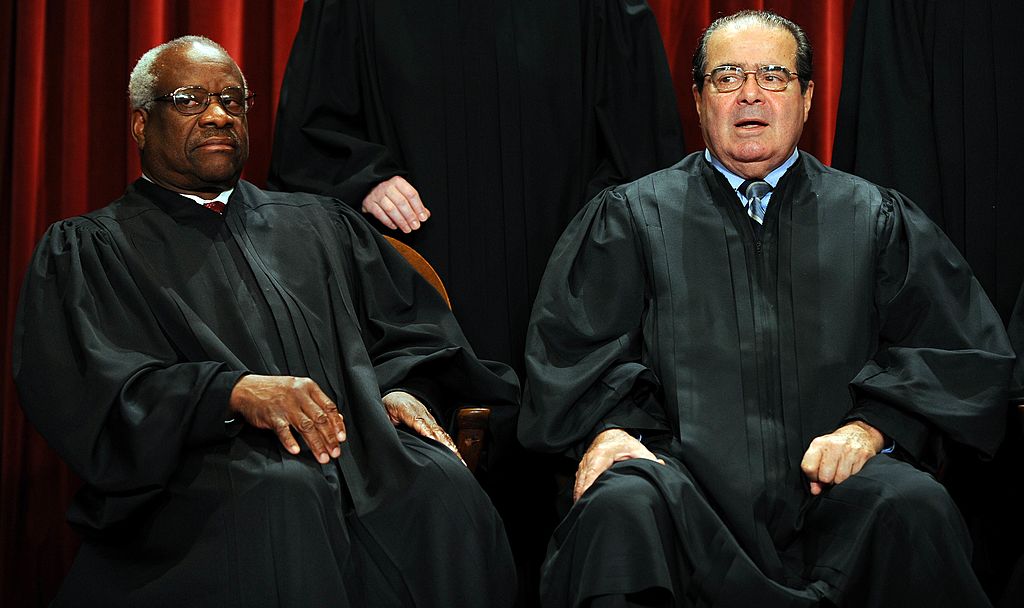The Supreme Court let an assault weapon ban stand, and two justices are very upset


A free daily email with the biggest news stories of the day – and the best features from TheWeek.com
You are now subscribed
Your newsletter sign-up was successful
The New York Daily News has turned its front page into a bully pulpit to advocate for gun control since the terrorist mass shooting in San Bernardino, California, last week, but Tuesday's cover isn't an attack or passive-aggressive zinger — it's a thank you note:
On Monday, the Supreme Court decided, 7-2, not to hear an appeal of an assault weapon ban in the Chicago suburb Highland Park, letting the ordinance stand. "The justices don't reveal their reasons for denying review, but one thing is clear," UCLA law professor Adam Winkler told The New York Times: "The justices certainly aren't eager to take up a Second Amendment case these days.... One has to wonder," he added, "if the Supreme Court is having second thoughts about the Second Amendment."
Justice Clarence Thomas isn't having second thoughts, and he explained why he wanted to overturn the ban in a six-page dissent joined by Justice Antonin Scalia. He started out by reminding the court of its two previous decisions, Heller in 2008 and McDonald v. Chicago in 2010, that recognized for the first time that "the Second Amendment protects a personal right to keep and bear arms for lawful purposes." Lower courts have been "relegating the Second Amendment to a second-class right," he added.
The Week
Escape your echo chamber. Get the facts behind the news, plus analysis from multiple perspectives.

Sign up for The Week's Free Newsletters
From our morning news briefing to a weekly Good News Newsletter, get the best of The Week delivered directly to your inbox.
From our morning news briefing to a weekly Good News Newsletter, get the best of The Week delivered directly to your inbox.
The Highland Park ordinance "criminalizes modern sporting rifles (e.g., AR-style semiautomatic rifles), which many Americans own for lawful purposes like self-defense, hunting, and target shooting," Thomas wrote, lecturing the 7th Circuit U.S. Court of Appeals, which let the ordinance stand. "If a broad ban on firearms can be upheld based on conjecture that the public might feel safer (while being no safer at all), then the Second Amendment guarantees nothing."
Thomas couldn't get his fellow conservatives to take up the case, but most experts say the high court will have to revisit gun laws at some point. Gun-rights advocates argue that when it does, such assault weapon bans will be struck down. But Winkler says the Supreme Court's non-ruling ruling is sending a different signal. "The court’s action will encourage gun control advocates to push for bans on assault weapons," he said. "This is one of the items at the top of the gun control agenda. Now advocates have less to fear from the courts on this issue."
A free daily email with the biggest news stories of the day – and the best features from TheWeek.com
Peter has worked as a news and culture writer and editor at The Week since the site's launch in 2008. He covers politics, world affairs, religion and cultural currents. His journalism career began as a copy editor at a financial newswire and has included editorial positions at The New York Times Magazine, Facts on File, and Oregon State University.
-
 How the FCC’s ‘equal time’ rule works
How the FCC’s ‘equal time’ rule worksIn the Spotlight The law is at the heart of the Colbert-CBS conflict
-
 What is the endgame in the DHS shutdown?
What is the endgame in the DHS shutdown?Today’s Big Question Democrats want to rein in ICE’s immigration crackdown
-
 ‘Poor time management isn’t just an inconvenience’
‘Poor time management isn’t just an inconvenience’Instant Opinion Opinion, comment and editorials of the day
-
 ‘One Battle After Another’ wins Critics Choice honors
‘One Battle After Another’ wins Critics Choice honorsSpeed Read Paul Thomas Anderson’s latest film, which stars Leonardo DiCaprio, won best picture at the 31st Critics Choice Awards
-
 Son arrested over killing of Rob and Michele Reiner
Son arrested over killing of Rob and Michele ReinerSpeed Read Nick, the 32-year-old son of Hollywood director Rob Reiner, has been booked for the murder of his parents
-
 Rob Reiner, wife dead in ‘apparent homicide’
Rob Reiner, wife dead in ‘apparent homicide’speed read The Reiners, found in their Los Angeles home, ‘had injuries consistent with being stabbed’
-
 Hungary’s Krasznahorkai wins Nobel for literature
Hungary’s Krasznahorkai wins Nobel for literatureSpeed Read László Krasznahorkai is the author of acclaimed novels like ‘The Melancholy of Resistance’ and ‘Satantango’
-
 Primatologist Jane Goodall dies at 91
Primatologist Jane Goodall dies at 91Speed Read She rose to fame following her groundbreaking field research with chimpanzees
-
 Florida erases rainbow crosswalk at Pulse nightclub
Florida erases rainbow crosswalk at Pulse nightclubSpeed Read The colorful crosswalk was outside the former LGBTQ nightclub where 49 people were killed in a 2016 shooting
-
 Trump says Smithsonian too focused on slavery's ills
Trump says Smithsonian too focused on slavery's illsSpeed Read The president would prefer the museum to highlight 'success,' 'brightness' and 'the future'
-
 Trump to host Kennedy Honors for Kiss, Stallone
Trump to host Kennedy Honors for Kiss, StalloneSpeed Read Actor Sylvester Stallone and the glam-rock band Kiss were among those named as this year's inductees
